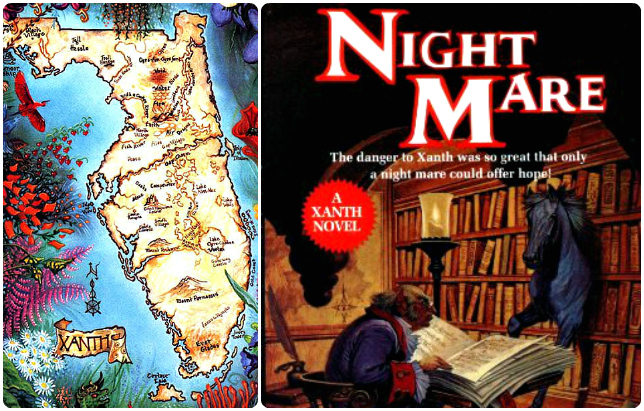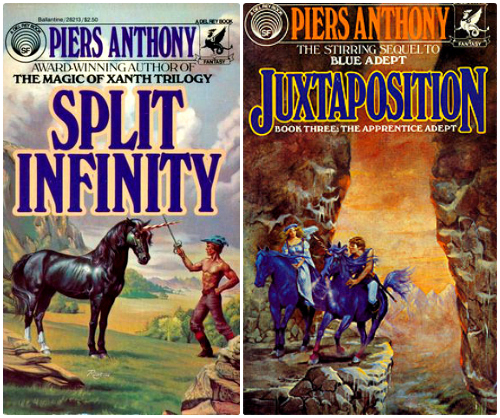Piers the Punster
While some writers employ the extended metaphor, Piers Anthony employs the extended pun. His Xanth novels are bursting with wordplay, because Xanth itself is a land of puns. Night Mares are black horses that deliver bad dreams (i.e., nightmares) to the residents of Xanth and Mundania (our world). Lake Ogrechobee, named after Florida's Lake Okeechobee, is where the ogres dwell. The Kiss Me River (Kissimmee River) is enchanted, so that if you drink from it, you have an overwhelming urge to kiss the person nearest you. People get rather affectionate after indulging in a love spring and when visiting the Isle of View (say it quickly and it sounds like 'I love you'). Money really does grow on trees (silver trees, to be exact), as do pies (pie plants), shoes (shoe trees), bread (breadfruit trees), and many other things. The Brain Coral is...you guessed it...a very intelligent species of coral. Xanthian children go nuts for eye scream, a popular frozen dessert made from the eyes of special birds. And Honeymoon is the go-to destination for newlyweds, because it is the sweet, pretty side of the moon (as opposed to the ugly side, which is made of green cheese).

But those are just the tip of the iceberg. Most of the creatures, concepts, plants, places, people, and objects in Xanth are puns. Furthermore, the titles and plots of the novels are sometimes puns, as well. Take, for example, Heaven Cent (heaven sent), Cube Route (cube root), or Board Stiff. In the last novel, a girl named Kandy visits the Wishing Well and wishes for adventure, excitement, and romance because she is bored with her current life. Next thing she knows, she's transfigured into a stiff, wooden board that has been picked up by a man named Ease. True to the wily nature of magical things, Kandy eventually does get her wish...she just had to become a wooden plank first.
That plot, along with many others, may seem silly on the surface. Yet underlying the playfulness is a discussion about relevant issues, such as global warming and pollution (Xone of Contention) and the demotion of Pluto from planet-status (Jumper Cable). Woven throughout the fun are also important messages, like being careful what you wish for (Board Stiff); beauty isn't everything (Cube Route); love sometimes comes in unconventional forms (Zombie Lover); people are capable of bettering themselves (The Dastard); anyone (even a horse) can change the world (Night Mare); and that children should be neither underestimated nor undervalued (Dragon on a Pedestal, Heaven Cent).
But Piers Anthony writes serious literature, too. In fact, the first book of his that I'd read (when I was twelve) was Split Infinity, from the Apprentice Adept heptalogy. Unlike the Xanth novels, which are strictly fantasy, this series is science-fantasy. It tells of two parallel worlds--scientific Proton and magical Phaze--that are separated by an invisible 'curtain'. At first glance, they look like polar opposites, but they are actually more similar than one would think. A person living in Proton has a double in Phaze, and vice versa. Even the magical beings (e.g. elves, gnomes, and unicorns) have a scientific double. The geography of each world mirrors the other's, but because Proton's environment has been destroyed by the overmining of resources, this fact is not immediately apparent. Although superficially it may seem that magic and science are, by definition, mutually exclusive, the reader quickly realizes that they are in fact identical. It is only the modes and mediums that differ. Magic employs spells, songs, wands, and unicorn horns, while science uses technology. But in the Apprentice Adept series, the source energy for both magic and science is the same, and they both accomplish the same things. The Brown Adept in Phaze, for example, uses magic to animate her wooden golems, while the residents of Proton use a battery pack to power their robots. Fundamentally different yet fundamentally similar. It is the juxtaposition of a paradox, and that, I think, is the crux of these novels.

Humor and gravity, fantasy and sci-fi, clever plots and characters to which the reader can relate...all these things are enough to make a book or a book series enjoyable. But Piers Anthony's work has an extra facet that keeps me hooked even fourteen years later: personality. The entire novel seems like a character, thanks simply to Piers Anthony's writing style. It's unfussy without being basic. It's dry, punnish, and sometimes almost satirical. It's just informal enough that it can be called irreverent but not quite derisive. It's tongue-in-cheek, without actually being insincere. Because Piers Anthony is sincere about everything he commits to paper--from puns to morality and everything in between.






